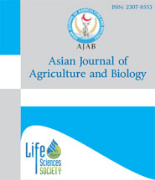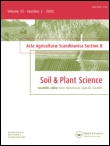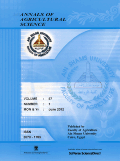
Icelandic Agricultural Sciences
Scope & Guideline
Fostering Collaboration for Agricultural Excellence
Introduction
Aims and Scopes
- Agricultural Practices and Innovations:
The journal emphasizes new methodologies and practices in agriculture, particularly those suited to the unique climatic and soil conditions of Iceland. This includes studies on feed intake, nutrient absorption, and overall livestock management. - Forest Ecology and Management:
Research on various tree species, their growth models, and ecological interactions is a key focus. The journal contributes to understanding forest regeneration, disease impacts, and carbon sequestration potential of Icelandic forests. - Wildlife and Ecosystem Interactions:
The journal includes studies on the impacts of agriculture and forestry on local wildlife, as well as biodiversity assessments. This encompasses research on parasites in livestock and the effects of climate on wildlife distribution. - Soil and Fertilization Studies:
Research on soil health, organic fertilization impacts, and interactions with plant growth is prominent. The journal aims to provide insights into sustainable practices that enhance soil fertility and crop yields. - Environmental Impact Assessments:
Studies that evaluate the environmental impacts of agricultural and forestry practices are also included, focusing on sustainability and the mitigation of negative effects on local ecosystems.
Trending and Emerging
- Climate Change Effects on Agriculture:
Research examining the effects of climate variables, such as temperature on species distribution, is gaining traction. This theme is crucial as it addresses the immediate challenges faced by Icelandic agriculture in adapting to a changing climate. - Sustainable Practices in Agriculture and Forestry:
There is an increasing focus on sustainable agricultural practices, including organic fertilization and its interactions with soil health. This trend highlights the importance of integrating sustainability into agricultural research. - Impact of Industrial Activities on Agriculture:
Studies assessing the impacts of industrial activities, such as aluminum smelting on livestock health, are emerging. This reflects a growing awareness of environmental pollution and its consequences for agriculture and ecosystem health. - Modeling and Predictive Analytics in Forestry:
The development of individual-tree growth models for various tree species is trending, showcasing a move towards data-driven approaches to forest management and conservation. - Biodiversity and Wildlife Studies:
Research on the interactions between agriculture and wildlife is gaining importance, particularly as it relates to conservation efforts and understanding ecosystem dynamics in the face of agricultural expansion.
Declining or Waning
- Traditional Livestock Diseases:
Research focused specifically on traditional livestock diseases, while still relevant, seems to be less frequently published. This may indicate a shift toward more innovative or integrated approaches to livestock health that encompass broader ecological impacts. - Historical Agricultural Practices:
Studies that explore historical agricultural practices are appearing less frequently, possibly reflecting a growing interest in contemporary issues and future-oriented agricultural innovations rather than retrospective analyses. - Geographic Distribution Studies of Non-native Species:
While important, the focus on the geographic distribution of non-native species in Iceland is waning, potentially due to a shift towards more pressing environmental issues such as climate change impacts and biodiversity conservation.
Similar Journals

Asian Journal of Agriculture and Biology
Navigating the future of agriculture and biology with impactful research.Welcome to the Asian Journal of Agriculture and Biology, a premier open access journal published by LIFE SCIENCES SOC PAKISTAN, dedicated to advancing research in the fields of agricultural and biological sciences. Since its inception in 2013, this journal has provided a vital platform for scholars and practitioners to disseminate novel findings and innovative methodologies that contribute to the betterment of agricultural practices and biological research. With an impressive H-Index and ranked in the Q3 category across multiple disciplines including Agricultural and Biological Sciences, Biochemistry, Genetics, and Molecular Biology, as well as Medicine, the journal showcases high-quality research that influences both academic and practical applications globally. The journal is indexed in Scopus, reinforcing its commitment to high academic standards and providing researchers with efficient access to significant knowledge. Based in Pakistan, the Asian Journal of Agriculture and Biology is your gateway to staying abreast of the latest trends and discoveries that support sustainable development and health sciences.

International Journal of Plant Production
Innovating solutions for sustainable plant production systems.International Journal of Plant Production, published by SPRINGER in Switzerland, serves as a leading platform for the dissemination of innovative research in the fields of Agronomy, Crop Science, and Plant Science. With an ISSN of 1735-6814 and an E-ISSN of 1735-8043, this journal has maintained its reputation by achieving a Q2 quartile ranking in both categories as of 2023, alongside notable Scopus rankings placing it in the top quartiles of its fields (Rank #105/516 and Rank #88/406, respectively). The journal's scope encompasses a wide array of topics vital to sustainable agriculture and plant production systems, making it a critical resource for researchers, professionals, and students striving for advancements in these disciplines. By fostering open scientific dialogue and supporting cutting-edge research, the International Journal of Plant Production is committed to contributing to the resolution of global food security challenges, enhancing agricultural practices, and promoting ecological sustainability.

ACTA AGRICULTURAE SCANDINAVICA SECTION B-SOIL AND PLANT SCIENCE
Transforming Research into Real-World Agricultural SolutionsACTA AGRICULTURAE SCANDINAVICA SECTION B-SOIL AND PLANT SCIENCE, published by Taylor & Francis AS, is a distinguished journal dedicated to the fields of Agronomy, Crop Science, and Soil Science. With an impressive impact factor, and categorized in Q2 for both Agronomy and Crop Science and Soil Science as of 2023, this journal is an essential resource for researchers, professionals, and students aiming to advance their understanding of soil-plant interactions and sustainable agricultural practices. Operating since 1992 and continuing through to 2024, ACTA aims to publish high-quality, peer-reviewed research that encourages the applicability of advanced scientific knowledge in real-world agricultural settings. While the journal is not open access, it remains widely accessible through institutional subscriptions, reflecting its commitment to disseminating essential findings and fostering innovation in soil and plant science worldwide. Nestled in the vibrant academic environment of Norway, ACTA AGRICULTURAE SCANDINAVICA serves as a key platform for nurturing groundbreaking research that informs sustainable agricultural policies and practices globally.

ANNALS OF AGRICULTURAL SCIENCES
Empowering the Agricultural Community Through Open Access ResearchANNALS OF AGRICULTURAL SCIENCES, published by Elsevier, stands as a leading open access journal dedicated to the multifaceted field of agricultural sciences. Since its inception in 2011, this journal has served as a pivotal platform for the dissemination of high-quality research, covering areas such as agronomy, animal science, horticulture, food science, plant science, and soil science. With an impressive Q1 ranking across multiple disciplines and notable positions in Scopus Ranks—including #6 in Animal Science and Zoology and #3 in Horticulture—this journal is recognized globally for its significant contribution to advancing agricultural innovations. The journal caters to a diverse audience of researchers, professionals, and students, providing them with open access to cutting-edge studies that address critical issues in agricultural productivity and sustainability. Its commitment to high-impact research ensures that articles contribute meaningfully to the scientific community, fostering advancements in agricultural practices and policies.

BRAGANTIA
Cultivating Insights for Agricultural ExcellenceBRAGANTIA, published by the Instituto Agronômico, is a distinguished open access journal that has been a vital resource since its inception in 1977. With an ISSN of 0006-8705 and E-ISSN 1678-4499, this journal is recognized for its contributions to the field of Agricultural and Biological Sciences, where it currently holds a respectable Q2 ranking as of 2023. Additionally, BRAGANTIA is indexed in various databases, supporting its impact within Materials Science (Q3 ranking). Positioned in Brazil, the journal promotes the dissemination of high-quality research, aiming to bridge the gap between academia and practical applications in agricultural innovation and sustainability. Researchers, professionals, and students looking to keep abreast of recent advancements and their implications will find BRAGANTIA to be an indispensable platform for sharing and accessing vital agricultural knowledge.

Agrociencia Uruguay
Empowering Research, Cultivating InnovationAgrociencia Uruguay, published by the Universidad de la República, Facultad de Agronomía, serves as a vital academic platform in the field of agricultural and biological sciences. Since its inception in 1997, this Open Access journal has fostered the dissemination of innovative research findings, promoting collaboration among researchers, professionals, and students interested in agronomy, crop science, soil science, and plant science. Operating from Montevideo, Uruguay, the journal strives to address contemporary challenges in agriculture through the publication of high-quality, peer-reviewed articles. Despite its relatively modest impact factors and rankings in Scopus, positioned in the lower percentiles, Agrociencia Uruguay remains crucial for advancing local and regional agricultural knowledge, thus contributing to global food security and sustainable practices. Researchers are encouraged to engage with the journal's content to further enhance their understanding and explore the rich agricultural landscape of Uruguay and beyond.

Revista de Agricultura Neotropical
Transforming Challenges into Opportunities in AgricultureRevista de Agricultura Neotropical, published by UNIV ESTADUAL MATO GROSSO SUL, serves as a pivotal platform for disseminating research in the fields of agronomy and crop science. Since its inception as an open-access journal in 2014, it has been dedicated to promoting innovative research and practical applications within the agricultural sector, specifically tailored to the challenges and dynamics of the tropical agriculture landscape in Brazil and beyond. Although currently positioned in the Q4 quartile of Scopus rankings, and with a modest agricultural science percentile, the journal actively encourages contributions that highlight sustainable agricultural practices, tropical crop management, and emerging technologies in farming. With its commitment to open access, the Revista de Agricultura Neotropical broadens the reach of critical knowledge, making it accessible to researchers, professionals, and students alike, thus fostering a collaborative environment for advancing agri-scientific initiatives.

Journal of Agricultural Sciences
Connecting global scholars in agricultural sciences.Journal of Agricultural Sciences is an esteemed peer-reviewed journal dedicated to advancing research and knowledge in the field of agricultural and biological sciences. Published by Sabaragamuwa University of Sri Lanka, this journal has been an open access platform since 2005, providing valuable insights and innovative findings to a global audience. With an ISSN of 1391-9318 and an E-ISSN of 2386-1363, the journal currently holds a Q3 ranking in the Agricultural and Biological Sciences category, reflecting its commitment to maintaining high standards of scholarship. The journal's Scopus ranking places it at #102 out of 193 in its field, signifying its impact and relevance. Covering a wide range of topics from sustainable agriculture practices to advancements in biological research, the Journal of Agricultural Sciences serves as a crucial resource for researchers, professionals, and students alike, fostering knowledge exchange and promoting agricultural innovation. We invite you to explore our rich repository of research and contribute to the ongoing discourse in the vital area of agricultural sciences.

Agricultural Science and Practice
Fostering collaboration for a resilient agricultural landscape.Agricultural Science and Practice is a pivotal journal dedicated to advancing knowledge and research in the field of agricultural sciences. Published by the NATIONAL ACADEMY OF AGRARIAN SCIENCES OF UKRAINE, this journal serves as a vital resource for researchers, professionals, and students engaged in agriculture, agronomy, and related disciplines. The journal aims to disseminate high-quality, peer-reviewed articles that address contemporary issues, innovative practices, and advancements in agricultural methodologies. While currently specified as non-open access, the journal endeavors to contribute significantly to the global agricultural knowledge pool while fostering a collaborative research environment. With its base in Kyiv, Ukraine, Agricultural Science and Practice plays an essential role in highlighting regional agricultural challenges and solutions, thereby attracting a diverse readership that aspires to enhance food security and sustainable farming practices worldwide.

Turkish Journal of Agriculture and Forestry
Empowering research in agriculture and ecological sciences.Turkish Journal of Agriculture and Forestry, published by the Tubitak Scientific & Technological Research Council Turkey, stands as a significant platform for disseminating impactful research in the fields of agriculture, forestry, and ecological sciences. With an ISSN of 1300-011X and an E-ISSN of 1303-6173, this esteemed journal has maintained its commitment to advancing scientific knowledge since its inception in 1994 and continues to provide peer-reviewed content through 2024. The journal has earned a commendable Q2 ranking in multiple categories, including Ecology, Food Science, and Forestry, as well as impressive Scopus rankings within its respective categories, placing it in the top quartiles of its fields. This positions the Turkish Journal of Agriculture and Forestry as a critical resource for researchers, professionals, and students seeking to explore innovative solutions and significant advancements in agricultural practices and ecosystem management.